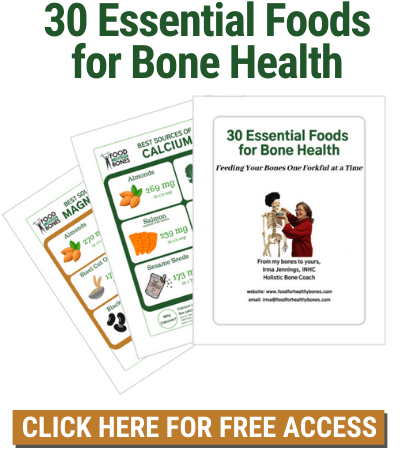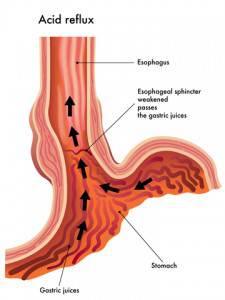Rosie O’Donnell and I have something in common. Recently we both had the same health scare – chest pains. I was luckier than Rosie. Her pain turned out to be a heart attack. Mine - we think - was indigestion.
I’m pretty careful about my food, so indigestion was a puzzle. Was I eating too many of those delicious candy like but acidic cherry tomatoes from my backyard garden? Was it stress? Or lifting too many heavy boxes during my move from Philadelphia to New Hope (don’t ya love that name…New Hope)? Or the heavy metals detoxification program I’ve been following? But that’s another story…
Whatever the cause, it got me thinking about how important good digestion is to everything – especially your bones. If you’re not digesting your food, you’re not breaking it down into the vitamins and minerals your bones need.
But could indigestion lead to a broken hip?
Maybe you’ve heard that indigestion or acid reflux is caused by having too much acid in your stomach. Drug companies have built a multi-billion dollar industry producing pills to block the production of stomach acid.
Doctors are writing over 110 million prescriptions every year for these proton pump inhibitors (PPIs). You may know these drugs by trade names that have become household words thanks to a flood of consumer ads: Nexium (“the little purple pill,”) Prilosec, Prevacid and Protonix, among others.
What do acid reflux drugs have to do with our bones?
Research has linked these acid reflux drugs to bone fractures.
In fact, in 2011, the FDA required drug warnings based on six published studies showing an increased risk of hip, wrist and spine fractures. The risk was greatest for patients on high doses of prescription PPIs and for those on a PPI for a year or more.
How do acid reflux drugs increase fracture risk?
PPIs work by reducing the amount of hydrochloric acid (HCl) your stomach produces. However, your stomach makes acid for a good reason. It’s how your food gets broken down and digested.
When you turn down the dial on stomach acid production, you also turn down the dial on the absorption of certain key bone nutrients like calcium, magnesium, vitamin B12, vitamin C, folic acid, iron and zinc. If your stomach doesn’t absorb these nutrients, they never make it to your bones. Eventually that can lead to weaker bones and even fractures.
But here’s the irony. Acid reflux is not caused by too much stomach acid but by acid coming up out of the stomach instead of staying where it belongs.
Dr. Julie Lachman, a naturopathic doctor and founder of My Innate Wellness in Doylestown, PA, explains it this way:
“Where the esophagus joins the stomach there is a round muscle called a sphincter. This sphincter closes and keeps the stomach contents, including the acid, in the stomach to be digested. What causes this muscle to contract? Its contraction is actually triggered by hydrochloric acid; therefore giving pills to reduce acid is counterproductive.”
Is Less Better?
The truth is that as we get older, most of us produce less stomach acid naturally. That’s why so many elderly people have difficulty absorbing vitamin B12 from meat and dairy products – they can’t break down their food. Taking PPIs - which reduce stomach acid even more - just makes matters worse – both for your digestion and for your bones.
The long term use of acid blockers can lead to crippling side effects - like fractures. Why risk the health of your bones?
There are natural remedies that really work to relieve symptoms of acid reflux (also called Gastroesophageal Reflux Disease, or GERD). Many naturopaths and other integrative doctors actually prescribe more hydrochloric acid to relieve GERD.
Another short-term traditional remedy is to drink a tablespoon of organic apple cider vinegar in a glass of water before meals. “If you don't like the taste,” says Dr. Lachman, “it is also effective by inhalation; you should feel the glands in the back of your jaw start to work just by smelling it.”
But these remedies are just treating the symptoms. Dr. Lachman’s approach goes deeper. She says:
“What I look at naturopathically is why the individual is not producing HCl on his or her own. This can be a part of aging, but keep in mind that healthy aging includes healthy digestion. Therefore, I focus on increasing the vitality and digestive capacity of the person, while using short-term interventions to control symptoms.
I recently saw a young woman with a 15-year history of GERD. After 4 days of treatment her symptoms were controlled. Then, over time we will work on actually tonifying the lower esophageal sphincter and increasing the digestive function.”
What else can you do for yourself?
My gentlemen client (yes, men are diagnosed with osteopenia), who had been taking Zantac for years, set his intention of eliminating this pill popping moment after eating. With a few tweaks to his diet, his commitment to the outcome, he is now Zantac free!
A great strategy is to avoid foods that trigger acid reflux. Typical culprits include foods high in acid like coffee, chocolate, sodas, alcohol, grapefruit, tomatoes and fried foods. But remember - everyone is different and you may have other triggers.
Also try adding soothing foods that support healthy digestion like oatmeal, ginger, parsley, celery, leafy greens and fennel.
What did I do?
I cut out the homegrown tomatoes, stopped the heavy lifting (even though it's a weight bearing exercise) made my green smoothies, and chilled out. Luckily, I'm back to normal.
Now it’s your turn.
- Do you suffer from heartburn, acid reflux or indigestion?
- What triggers it for you?
- What remedies have you tried?
Thanks for sharing/reposting my blog with the easy share links below and leaving your comments. That’s how our community grows.
Your bones thank you as do I!
Resources:
https://www.foxnews.com/health/2011/03/24/fda-acid-reflux-drugs-increase-risk-fractures/#ixzz1I95U1efW
https://articles.mercola.com/sites/articles/archive/2009/04/25/news-flash-acid-reflux-caused-by-too-little-acid-not-too-much.aspx
Let Me Support Your Bones
Get Customized In-Depth Private Session
Book a Private Coaching with Irma Now
Join Our Amazing Bone Tribe Community
Get the support & information you need to live fearlessly with your bones diagnosis
From my bones to yours,
Irma Jennings, INHC
Your Holistic Bone Coach
[email protected]



